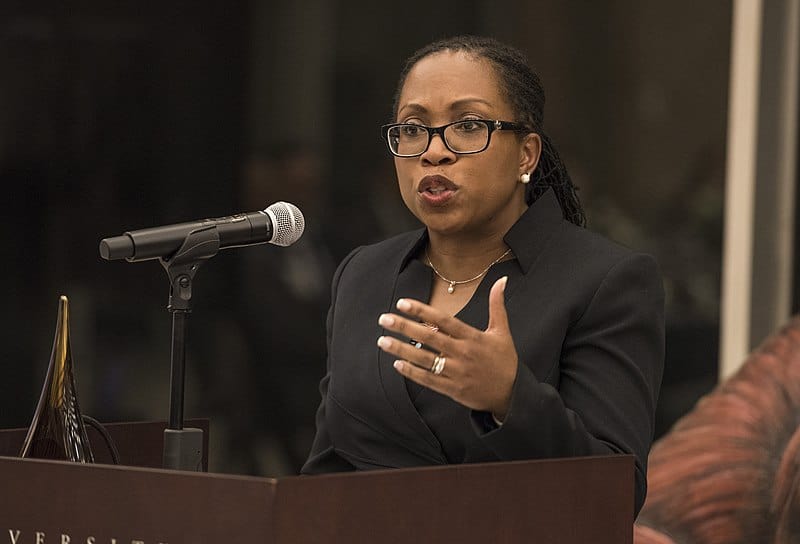
Tascha Shahriari-Parsa is a government lawyer enforcing workers’ rights laws. He clerked on the Supreme Court of California after graduating from Harvard Law School in 2024. His writing on this blog reflects his personal views only.
Earlier this morning, Bloomberg Law reported that Joe Biden plans to nominate Judge Ketanji Brown Jackson as the first Black woman on the Supreme Court. Earlier this month, Brown’s first decision after her appointment to the Court of Appeals for the D.C. Circuit struck down a 2020 rule by the Federal Labor Relations Authority to make it harder for public sector workers to engage in collective bargaining. When she was on the U.S. District Court for the District of Columbia, she also halted three of Trump’s executive orders that would have respectively boxed the subjects that federal workers’ unions could bargain with the government over, reduce the time that unionized federal employees can spend on union business (because it was, according to the Trump-FLRA, a waste of taxpayer money), and limit workers’ rights to appeal disciplinary actins. Jackson stated that these orders would have “eviscerate[d]” the collective bargaining rights of federal workers—though her decision was later reversed by the D.C. Circuit.
This morning, a panel of the D.C. Circuit—including Judge Jackson—heard oral arguments on the Board’s joint employer standard in Sanitary Truck Drivers v. NLRB. In 2015, the Board changed the joint-employer standard to require that a business have “sufficient control over employees’ essential terms and conditions of employment to permit meaningful collective bargaining” in order to be considered a joint-employer. In 2018, the D.C. Circuit required the Board to go back and explain some of the factors that constituted “sufficient control.” Then, in 2020, Trump passed a regulation that shifted the joint employer test, requiring “substantial direct and immediate control” over workers for a business to be considered a joint-employer.
Much of the controversy in the current case is on the question of retroactivity, as the Board in 2020 then ruled that it would be unfair to retroactively apply the 2015 rule to events in 2013, because the business had constructed its business model in reliance of the pre-2015 standard. The Board justified the retroactivity standard on the basis that the 2015 Board decision was a “sea change” in board law that completely transformed the legal structure in which employers operated. You can listen to the oral arguments here; the case is second in order and begins about 30 minutes in.
In more Starbucks news, on Wednesday, 29 chairs and vice-chairs of house and senate committees on labor in 17 states and the District of Columbia submitted a letter on Wednesday urging Starbucks CEO Kevin Johnson to cease the company’s union–busting activities. As Kevin reported last Sunday, Starbucks has spent tens of millions of dollars to hire a law firm to turn its managers into union-busting experts, has launched a litany of propaganda including a website dedicated to persuading—or scaring—workers to vote against the union, and has been sending corporate managers into stores to convince workers not to unionize. Workers have cited “captive audience meetings, one-on-one meetings, store shutdowns, closures, remodelings, and text messages—a mode of contact that was previously used only for emergencies.”
The letter from the labor committee heads urges Starbucks “to follow the letter and spirit of the law by allowing [its] employees free choice in joining a union without coercion or retaliation . . . .” Rep. Zack Fields (D-Anchorage), Co-chair of the Alaska House Committee on Labor and Commerce, commented that “[t]he diversity of signatures from legislative leaders across the nation expresses the urgency in Starbucks Workers United fight for fair wages, benefits, and better working conditions.”
As William reported yesterday, Starbucks filed an appeal with the NLRB arguing that any union election should cover a broader region rather than a single store. Starbucks needed to submit a statement of position by noon on February 11th; however, Starbucks did not turn in the file until 12:03pm. Starbucks claimed that Microsoft Outlook crashed when counsel for Starbucks initially attempted to serve the Statement of Position. Starbucks and the union have argued over whether the 12pm deadline is a bright line rule, whether a delay can be excused for good cause, and the relevance of the absence of prejudice—prejudice that one might only expect if the delay was longer than a few minutes. The Board sided with the union and concluded that Starbuck’s failure to meet the 12pm deadline “precludes it from litigating any of the issues raised in its untimely submission.” The Board noted in particular that the applicable rules and regulations were amended in 2015 to intentionally institute a bright-line rule and consequences for non-compliance for matters including the statement of position that Starbucks failed to submit on time.






Daily News & Commentary
Start your day with our roundup of the latest labor developments. See all
November 24
Labor leaders criticize tariffs; White House cancels jobs report; and student organizers launch chaperone program for noncitizens.
November 23
Workers at the Southeastern Pennsylvania Transportation Authority vote to authorize a strike; Washington State legislators consider a bill empowering public employees to bargain over workplace AI implementation; and University of California workers engage in a two-day strike.
November 21
The “Big Three” record labels make a deal with an AI music streaming startup; 30 stores join the now week-old Starbucks Workers United strike; and the Mine Safety and Health Administration draws scrutiny over a recent worker death.
November 20
Law professors file brief in Slaughter; New York appeals court hears arguments about blog post firing; Senate committee delays consideration of NLRB nominee.
November 19
A federal judge blocks the Trump administration’s efforts to cancel the collective bargaining rights of workers at the U.S. Agency for Global Media; Representative Jared Golden secures 218 signatures for a bill that would repeal a Trump administration executive order stripping federal workers of their collective bargaining rights; and Dallas residents sue the City of Dallas in hopes of declaring hundreds of ordinances that ban bias against LGBTQ+ individuals void.
November 18
A federal judge pressed DOJ lawyers to define “illegal” DEI programs; Peco Foods prevails in ERISA challenge over 401(k) forfeitures; D.C. court restores collective bargaining rights for Voice of America workers; Rep. Jared Golden secures House vote on restoring federal workers' union rights.